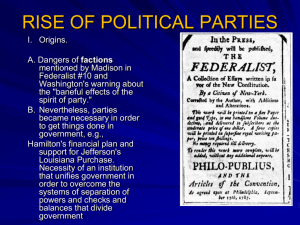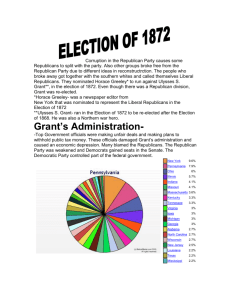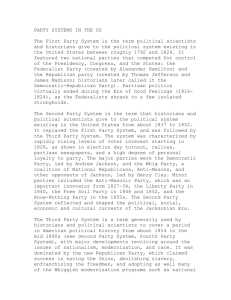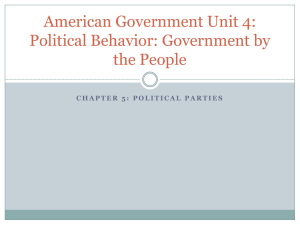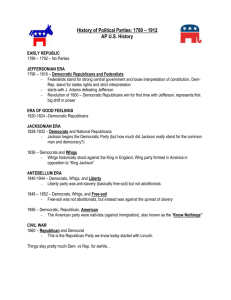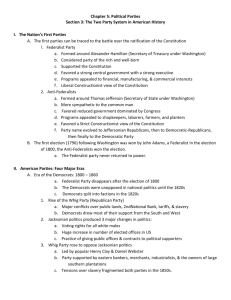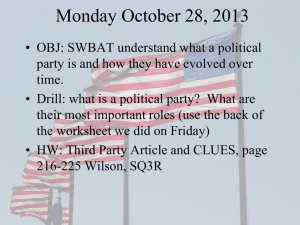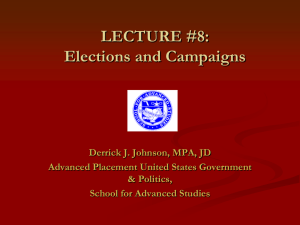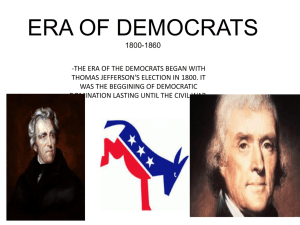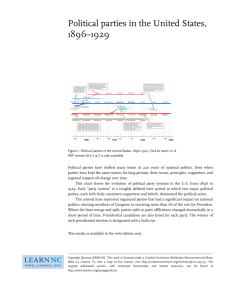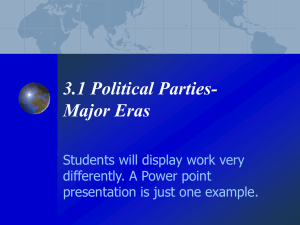ERA OF DEMOCRATS 1800-1860 Thomas Jefferson
advertisement
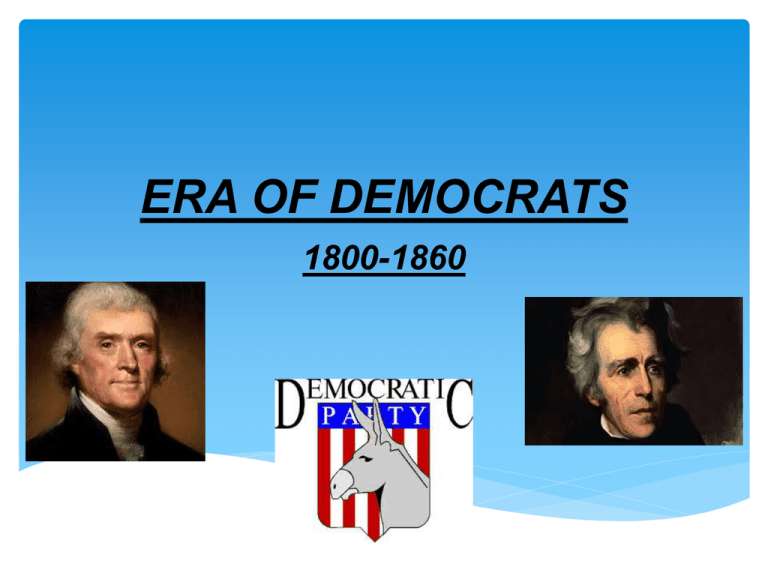
ERA OF DEMOCRATS 1800-1860 Thomas Jefferson (1800) Thomas Jefferson is elected president, ushering in an era of democratic domination that lasted until the civil war. Andrew Jackson(1828) President Andrew Jackson democratic party includes small farmers, debtors, frontier pioneers, and slaveholders. Years of Jacksonian democracy produced 3 changes in the nations political landscape: 1) Voting rights for all white males. 2) Huge increase in the number of elected officials around the country. 3) Spread of the spoils system. (1854) The republican party was born The republican party is born, attracting many former Whigs and antislavery Democracy. Republican Era 1860-1932 • Second Era • The republicans won 14 of the 18 elections, losing only in 1884,1892,1912, and 1916. • The civil war and the election of Abraham Lincoln were both marked the beginning of the 75 years of republican party supremacy. • They were supported by business and financial interests, and by farmers, laborers, and newly freed African Americans. • The election of 1896 was critical for the development of the two-party system. • The republicans nominated William McKinley for presidency in 1896 • The election was a victory for the republicans. • The worst setback of the Republican Era was in 1912, when Republicans re nominated William Howard Taft. Also Former President Theodore Roosevelt denied the nomination of his party and left the republican party to become a part of the “Bull Moose” progressive party. Therefore traditional republican support was divided between Taft and Roosevelt. As a result The Democratic Nominee Woodrow Wilson was able to capture the presidency. 1932-1968 Basic Knowledge • • • From the Great Depression (1929) to the landmark presidential election of 1932 brought the democrats to power at a national level This election marked a basic shift in the publics attitude towards the proper role of government in the nations social and economic life. 1932:The depression brings about a shift in the role of government and led by FDR thus causing return of Democrats to power. FDR and the Democrats: • Won the election of 1932 with the new electoral base that was built largely of southerners, small farmers. Organized labor and big city political organizations • Franklin Roosevelt's revolutionary economic and social welfare programs further strengthened that coalition causing increasing support fro African Americans and other minority groups • The stated election made the Democratic party the majority in American Politics a position that will be kept for the next 40 years Franklin Roosevelt • • President Roosevelt was put into power once again after the reelection of 1938 won again in 1940 and his fourth term in 1944 (during World War II) Death was bestowed upon the beloved FDR in April of 1945 Harry S. Truman • Elected to a full term of his own in 1948 against his opponent Thomas E. Dewey of New York Republicans Regain… • Republicans take back there spot in the White House in 1952 and kept it until 1956 with President Dwight Eisenhower • Their return to power was brief HOWEVER Senator JFK recaptured the presidency for Democrats in 1960 • This was done with a thin victory over the republican party's standard bearer • President Kennedy was shot and killed in 1963, causing Vice president Lyndon B. Johnson to become president with a full term of his own in 1964 Era of Divided Government • Richard Nixon made a successful return to presidential politics 8 years after his narrow loss to JFK in the 1960. • Nixon defeated Vice President Hubert Humphrey (the candidate of the democratic party) in 1968. 1968-PRESENT ERA OF DIVIDED GOVERNMENT From this election on, neither party consistently holds the presidency and congress is often controlled by the opposing party. Over much of the past 40 years, Republicans (GOP) have lived in the White House and Democrats have controlled Capitol Hill. • In 1968 Nixon was elected president with a fairly democratic congress even though he’s republican. The Watergate scandal forced him out of office and Gerald Ford served the rest of his second term. Fed up with problems, Ford lost to Democrat Jimmy Carter. • Jimmy Carter made a steadily worsening economy, political fallout from the Iranian hostage crisis, and revealed his own inability to be an effective president. Republican Advantage • Republicans won three straight elections after Jimmy Carter • In 1988 George H.W. Bush won presidency • Mr. Bush was done in by problems the plagued the nation’s economy • He was then defeated by Democrat Bill Clinton in 1992 • During Clinton’s presidency, the Republican- controlled congress mounted an unsuccessful attempt to impeach Clinton in his second term. • The Republicans did regain control when George W. Bush won presidency Democratic Advantage • In recent years, GOP suffered significant loss because of the dissatisfaction with several Bush administration policies and the Iraq war. • The democrats regained control in both houses in the 2006 elections • In 2008, Barack Obama won presidency and put the Democratic party in a position it hadn’t been in since 1994-when GOP took control of congress in the midst of Clinton’s first term. • • • Ideological parties are groups of people based on a particular set of beliefs- a comprehensive view of social, economic, and political. Ideological parties have seldom been able to win many votes. They have long-lived. Examples: Socialist, socialist labor, socialist worker, and communist parties. A political party that actively advocates a communist form of government; in Communist countries it is the sole political party of the state. By August 1919, only months after its founding, the Communist party had 60,000 members. Its constitution was first published in 1987. The constitution states the Communist Party USA is "the party of and for the U.S. working class." The party was concentrating on helping to build labor unions and improving workers' rights. They lobbied for higher wages, a national retirement program, and unemployment insurance. It works to battle capitalism and the drive for maximum profits, because it believes the living standards of workers and the natural environment are under attack. Information can be found http://www.encyclopedia.com/topic/Communist_party_(United_States).aspx Single-Issue Parties Single-issue parties concentrates on one public policy matter. Free Soil Party: against the spread of slavery during the 1840s-1850s. Martin Van Buren was the president of this party. American Party “Know Nothings”: opposed Irish-Catholic immigration in the 1850s. Irish immigrated because of the Potato Famine. Right to Life Party: oppose abortion today • This party had faded away because its failure to attract voters. Major parties claimed their issues as their own. Ex. Republicans and abortion. WHAT ARE ECONOMIC PROTEST PARTIES? • PARTIES ROOTED IN POOR ECONOMIC TIMES, LACKING A CLEAR IDEOLOGICAL BASE, DISSATISFIED WITH CURRENT CONDITIONS AND DEMANDING BETTER TIMES. • BASICALLY THEY ARE RANDOMLY DEVELOPED POLITICAL PARTIES THAT AREN’T SURE ABOUT WHAT THEY WANT BUT THEY KNOW THAT TIMES SHOULD BE BETTER THAN THEIR CURRENT STATE. THE GREENBACK PARTY • THE PARTY APPEALED TO STRUGGLING FARMERS BY CALLING FOR THE FREE COINAGE OF SILVER, FEDERAL REGULATION OF THE RAILROADS, AN INCOME TAX AND LABOR LEGISLATION. • THE PARTY LASTED FROM 1876 TO 1884. POPULIST PARTY OF THE 1890’S • THE POPULIST PARTY WAS A DESCENDANT OF THE GREENBACK PARTY. • IT DEMANDED PUBLIC OWNERSHIP OF RAILROADS, TELEPHONE AND TELEGRAPH COMPANIES, LOWER TARIFFS, AND THE ADOPTION OF THE INITIATIVE AND REFERENDUM. SPLINTER PARTIES Splinter parties are those that have split away from one of the major parties. One of the most important minor party. BULL MOOSE PROGRESSIVE PARTY • Originally called progressive party of 1912 • Inspired by Theodore Roosevelt’s revolt against the Democratic and Republican parties. • Bull Moose Party promotes a progressive agenda through objectivity and pragmatism in politics. THE GREEN PARTY The green party founded in 1996. Began as a classic single-issue party. Became to prominence in 2000. In 2008, the green party nominated Cynthia McKinney.
